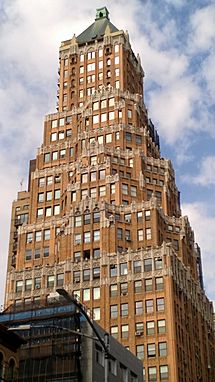75 Livingston Street facts for kids
Quick facts for kids 75 Livingston Street |
|
|---|---|
 |
|
| General information | |
| Type | Residential |
| Architectural style | Gothic Revival |
| Location | 75 Livingston Street, Brooklyn, New York 11201 |
| Coordinates | 40°41′31″N 73°59′30″W / 40.6919°N 73.9916°W |
| Completed | 1926 |
| Owner | Heights 75 Owners Corporation |
| Height | |
| Roof | 343 ft (105 m) |
| Technical details | |
| Floor count | 30 |
| Design and construction | |
| Architect | Abraham J. Simberg |
| Developer | Jacob Adelman |
75 Livingston Street, also known as the Court Chambers Building, is a tall residential building in Downtown Brooklyn, New York. It has 30 floors and stands about 343 feet (105 meters) high. This building was designed by Abraham J. Simberg and finished in 1926. Today, people live in apartments here.
Contents
About 75 Livingston Street
75 Livingston Street is a building where people own their apartments together. This is called a cooperative tower. It is located in the busy area of Downtown Brooklyn. The building was designed by an architect named Abraham J. Simberg. It was completed in 1926.
Building Design and Style
The building was first planned to be taller, about 430 feet (131 meters) high. It was also meant to have a dining room on the 25th floor's terrace. The building's style is called Gothic Revival. This style uses design ideas from old European churches and castles.
How the Building Changed
For a while, the building was also known as Court-Livingston. This was because it had another address on Court Street. When it was first built, 75 Livingston Street was an office building. Many businesses had their offices there. In 1981, the building changed. It was turned into cooperative apartments where people could live.
Landmark Status
In 2010, 75 Livingston Street became part of the Borough Hall Skyscraper Historic District. This district includes several old buildings nearby. Being in a historic district means a building gets "landmark status." This helps protect its unique look and history.
Disagreements About Landmark Status
Some people who lived in the building did not agree with this decision. They felt the building's design was not special enough to be a landmark. They also worried that landmark status would cost residents more money. Despite these concerns, the building was officially made a landmark in 2011.
See also
 In Spanish: 75 Livingston Street para niños
In Spanish: 75 Livingston Street para niños
 | Laphonza Butler |
 | Daisy Bates |
 | Elizabeth Piper Ensley |

